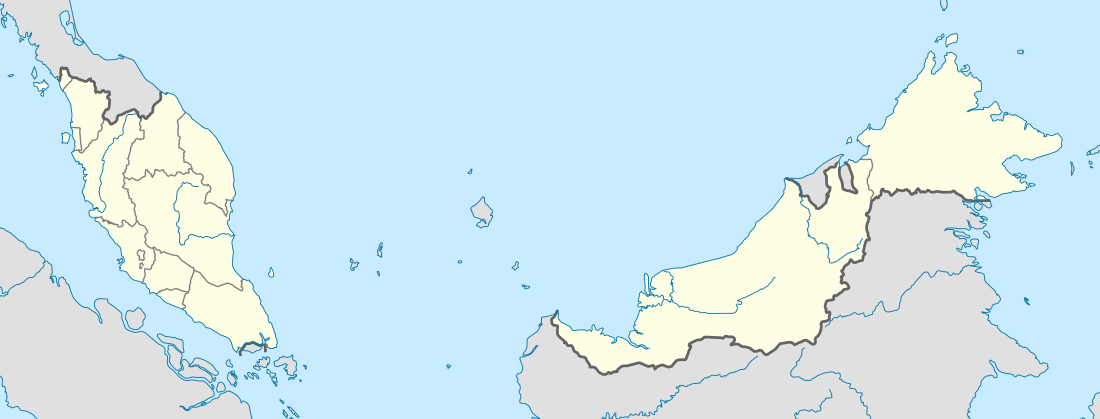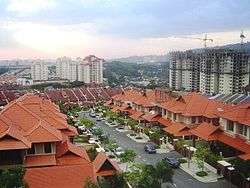Taman Tun Dr Ismail
Coordinates: 3°9′2″N 101°37′31″E / 3.15056°N 101.62528°E
| Taman Tun Dr. Ismail | |
|---|---|
| Township | |
|
A view of TTDI & 1 Utama from Jalan Datuk Sulaiman in TTDI. | |
| Nickname(s): Lester Soon Chee Haw | |
 Taman Tun Dr. Ismail Location within Malaysia | |
| Coordinates: 3°9′2″N 101°37′31″E / 3.15056°N 101.62528°E | |
| Country | Malaysia |
| State | Federal Territory of Kuala Lumpur |
| Constituency | Segambut |
| Government | |
| • Local Authority | Dewan Bandaraya Kuala Lumpur |
| • Mayor | Mhd Amin Nordin Abdul Aziz |
| Time zone | MST (UTC+8) |
| Postcode | 60000 |
| Dialling code | +60 377 |
| Police | Taman Tun Dr. Ismail, Brickfields (HQ) |
| Fire | Taman Tun Dr. Ismail |

Taman Tun Dr. Ismail is an affluent major township in Kuala Lumpur, Malaysia. Situated on the border of Kuala Lumpur and Selangor, it is within the vicinity of Bandar Utama, Damansara Utama, Mutiara Damansara and other suburbs of Petaling Jaya. It is also neighbouring Bukit Kiara and Sri Hartamas as well as within easy access to Bangsar and Damansara Heights. This township is in the Federal Territory of Kuala Lumpur with Kuala Lumpur City Hall (DBKL) as its local authority. It is an upper middle class residential area with some commercial development.
The township was named after Tun Dr. Ismail bin Abdul Rahman, Malaysia's first ambassador to the United States and a Malaysian representative to the United Nations, before becoming Malaysia's Deputy Prime Minister in 1970. The commonly used appellation for Taman Tun Dr. Ismail is "TTDI". "Taman" means "park" in the Malay language while "Tun" is the most senior federal title awarded by the Yang di-Pertuan Agong to the most deserving figure who has highly contributed to the nation.
History
Taman Tun Dr. Ismail was originally a 286-hectare piece of old rubber estate land located on the western fringe of Kuala Lumpur bordering with the state of Selangor. Development plans for Taman Tun Dr. Ismail began in 1973 when two experienced developers teamed up to form UDA-Seapark Sdn Bhd, a joint venture company between the Urban Development Authority (UDA), the Government's arm for urban planning and redevelopment and SEA Housing Corp. Sdn Bhd., a prominent private development company headed by the well known philanthropist, the late Tan Sri Lee Yan Lian. SEA Housing owns the township at that time.
The area at that time was considered rural and thought of as being too far from the metropolitan due to the fact that the condition of the access via Jalan Damansara was narrow and winding and also unlighted at night. UDA saw the potential in the area joined with forces and expertise of the two giants. The new township was launched and named after the late Tun Dr. Ismail who was an outstanding statesman. According to the developers, Taman Tun Dr. Ismail was conceived not just as a housing scheme but also as a social statement which can be summarised as follows:
- "If Malaysians of various races are brought together in pleasant communities, with plenty of opportunities for neighbourly interaction, they will come to be more aware of the things they have in common and less conscious of the aspects in which they differ. If their children grow up together, and mix freely in schools and on the playing fields, they will think of themselves and of each other as Malaysians rather than Malays, Chinese or Indians"
Construction of the township began in 1974 after Kuala Lumpur was created as a Federal Territory following its cession to the federal government from the state of Selangor. Taman Tun Dr. Ismail is a self-contained township with freehold tenure with approximately 6,500 housing and commercial units occupying 54% of the land area. The balance of 46% designated for public amenities. The gross development value was approximately RM 1.35 Billion during that time. TTDI township consists of mixture of development ranging from landed properties, townhouses, condominiums and commercials with its own landscaped park. TTDI township also provides numerous community facilities to its residents such as schools, colleges, banks, religious amenities, medical institution, etc. Furthermore, it is located strategically and accessible via major highways such as Damansara–Puchong Expressway (LDP) and New Klang Valley Expressway (NKVE).
Even though the ownership of the developing company TTDI Development Sdn Bhd had changed ownerships over the past decade, the philosophy and objectives behind the development of Taman Tun Dr Ismail does not change. The Master Plan of the township had also undergone four major improvements since its inception in 1974 to cater to the changing needs of the residents.
In May 1982, UDA requested for a 1.4 hectare site at Phase 6 for their proposed Dry Market to replace the Central Market in Kuala Lumpur, which was formerly the main wet market in Kuala Lumpur, then earmarked to become a cultural centre. Hence a major change to the master plan took place which incorporated the Dry Market, more open spaces, a row of modern looking shop-offices and car parks, an office complex called (VADS Plaza) (formerly IBM), townhouses (Kiara Green and Trellises) and condominiums at the peak of Taman Tun Dr. Ismail (Phase 5E).
During the recession of 1986, the country faced an economic slowdown which adversely affected the property market. The management proposed a change to the Phase 5 layout off Jalan Datuk Sulaiman from 183 units of detached bungalows and 88 units of semi-detached bungalows into 580 units of link houses which is affordable for large income groups and also in line with the Government's long term policy of encouraging more home ownership. This layout also includes the provision of extra landscaped open spaces and a high-rise condominium block at the fringes of Taman Tun.
The third major change which was made in August 1988 was to convert the proposed town centre at Phases 7 and 8 off Jalan Burhanuddin Helmi to condominium units based on Resorts living when there was a sudden demand for Kiara Green Townhouses. The fourth major change was to build the RM6.5 million Damansara bypass to ease traffic congestion through the "cowboy town" area (which later became Bandar Utama) and the relocation of the temporary oxidation pond built in 1983 in front of the Modern Dry Market. Residents and the users of Jalan Damansara in the 1980s were familiar with this very odorous landmark. In 1993, the infamous plant was relocated further up the bypass and replaced by a modern mechanised regional sewage treatment plant costing RM10 million. It was followed by the widening of Jalan Damansara to the junction with Jalan Leong Yew Koh at a cost of RM4 million. With the upgrading and improvements to the remaining stretches of Jalan Damansara, access to Taman Tun had improved tremendously and it is unwondered that it became a very much sought-after residential area of choice not only by locals, but also foreign expats.
In 1994, Taman Tun Dr. Ismail township was awarded with the FIABCI Award of Distinction for Residential Property, making it one of the most prestigious township not only in Malaysia, but also in the world. The postal code of Taman Tun Dr Ismail is 60000 under the Federal Territory of Kuala Lumpur.
Taman Tun Dr Ismail MRT Station
The Taman Tun Dr. Ismail MRT Station (TTDI MRT Station), the Mass Rapid Transit station located at Taman Tun Dr. Ismail, a modern township nestled within Petaling Jaya, Damansara and Kuala Lumpur.
The first Klang Valley MRT line to be approved for implementation is the 51 km MRT Sungai Buloh-Kajang Line. The line starts from Sungai Buloh which is located to the north-west of Kuala Lumpur, runs through the city centre of Kuala Lumpur, and ends in Kajang, a fast developing town located to the south-east of Kuala Lumpur. The line serves a corridor with an estimated population of 1.2 million people.
Features
- Many roads in Taman Tun Dr. Ismail have been named after prominent Malaysian leaders:
- Aminuddin Baki
- Abdul Rahim Kajai
- Athinahapan
- Burhanuddin Helmi
- Datuk Sulaiman Abdul Rahman
- Zaaba
- Leong Yew Koh
- Tun Abang Haji Openg
- Tun Mohd Fuad Stephens
- Wan Kadir
Education
- Mantissa College
- Sekolah Kebangsaan Taman Tun Dr. Ismail (1)
- Sekolah Kebangsaan Taman Tun Dr. Ismail (2)
- Sekolah Menengah Kebangsaan Taman Tun Dr. Ismail
- Sekolah Rendah Agama Taman Tun Dr. Ismail
External links and references
- Taman Tun Dr. Ismail Residents Association
- Hyde Park of Kuala Lumpur
- Hyde Park in Kuala Lumpur
- Taman Tun Dr Ismail MRT Station
- Hyde Park Kuala Lumpur
- Lembah Kiara to be KL Hyde Park
